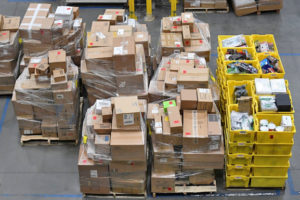Surge in global demand for essential Covid-19 medical supplies has necessitated the need for governments in developing countries such as Ghana, to collaborate with local producers to identify medical supplies that can be produced within.
However, some essential supplies are technologically advanced devices which will be difficult produce and, if at all possible, will require intellectual property access.
In view of this, the United Nations Economic Community for Africa (UNECA) and the Africa Trade Policy Centre (ATPC) is asking governments across Africa to invoke an emergency exemption from intellectual property rights protection on Covid-19 medical supplies.
UNECA and ATPC in a trade policy document for Africa to tackle Covid-19 said, “African governments should demand emergency exemption from intellectual property rights protections on Covid-19 medical supplies to support domestic production, particularly for pharmaceuticals.”
Such equipment include technologically advanced devices like ventilators, which will be difficult and, if at all possible, require access to intellectual property, technical expertise, rapid safety review and approval, and government assistance as well as accompanying medical personnel for their application, the policy document indicates.
The World Trade Organization’s (WTO), Trade-Related Aspects of Intellectual Property Rights (TRIPS) decisions establish a precedent for producers in developing and least-developed countries to use patents in otherwise protected pharmaceutical and other products.
This has become necessary given that reducingbe tariffs and facilitating imports of such supplies may not enough, in view of the imposition of export restrictions by at least 54 countries.
UNECA also recommends that following the example of manufacturing plants in Italy, China and India, capable African manufacturers must repurpose excess capacity to the production of essential Covid-19 medical supplies, including face masks, ventilators, test kits, disinfectants, and medical consumables.”
With an emerging global recession, African manufacturers are already experiencing declining orders and excess productive capacity.
“Production shifts in some products are relatively easy, including textile factories producing face masks and alcohol factories sanitizer,” UNECA stated.
For instance, in Ethiopia, the government has already worked with Sansheng Pharmaceuticals to produce hand sanitizers. In South Africa, U-Mask has redirected its production from protective masks for mining and agricultural companies to that for medical respirator masks.












